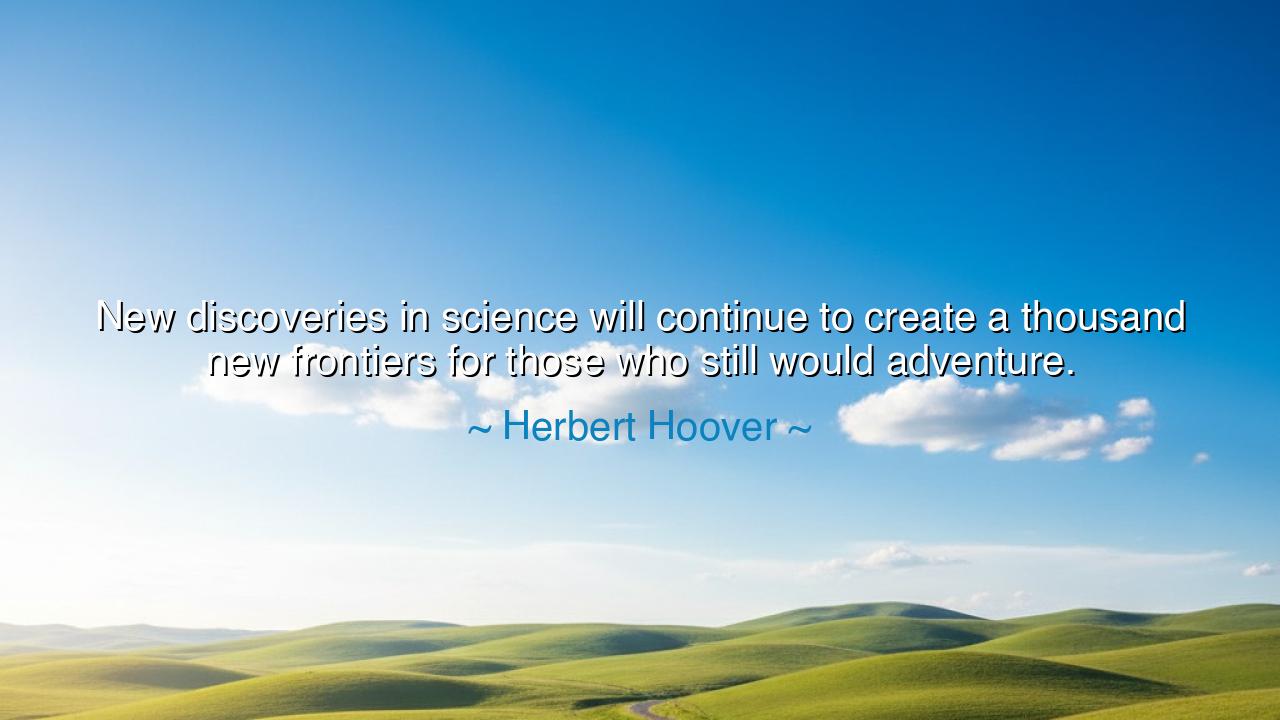
New discoveries in science will continue to create a thousand new
New discoveries in science will continue to create a thousand new frontiers for those who still would adventure.






"New discoveries in science will continue to create a thousand new frontiers for those who still would adventure." These words by Herbert Hoover resonate deeply, calling us to recognize the boundless potential of scientific discovery as a source of endless adventure. To Hoover, the essence of science is not merely the accumulation of knowledge, but the creation of new horizons for exploration. Science opens doors to unseen realms, pushing the limits of human understanding and providing opportunities for those who dare to venture into the unknown. With each new discovery, science not only illuminates the world, but invites us to step forward and embrace the infinite possibilities that lie just beyond the horizon.
In the ancient world, the great explorers and thinkers were driven by this same spirit of adventure. Consider the voyages of Homer’s Odysseus, whose journey through the seas was more than just a physical adventure; it was a pursuit of deeper truths about humanity, the gods, and the universe. The Greeks saw discovery as a quest for wisdom and understanding, much like the spirit that Hoover evokes. The ancients believed that to explore the unknown was to encounter the divine, to grow in knowledge and spirit. This is the same adventure that science offers us today: a chance to explore, to question, and to learn about the profound mysteries of the world we inhabit.
The pursuit of knowledge through science is not a modern invention. Throughout history, men and women have sought to expand the boundaries of what is known, to push beyond the limits of the present into the realms of the unfamiliar. Take, for example, the explorations of Christopher Columbus, whose voyages across the Atlantic Ocean were driven by the belief that there was more to the world than could be seen from Europe’s shores. His journey marked the beginning of a new era of discovery, not just in geography, but in science, trade, and culture. The spirit of adventure that led him to new lands was the same spirit that drives science today—an insatiable curiosity and a bold desire to uncover what lies just beyond our grasp.
In more modern times, the story of Marie Curie, who discovered the elements radium and polonium, serves as a powerful example of how science continues to create new frontiers. Her pioneering work in radioactivity not only changed the course of physics and medicine, but it opened entirely new fields of exploration. Curie, much like Columbus, ventured into the unknown, driven by a belief in the power of discovery. Her work was not without danger or difficulty, yet she moved forward, guided by the promise of a world yet to be fully understood. The discoveries that she made continue to inspire those who seek to push the boundaries of science, proving that adventure in the realm of knowledge is endless.
As Hoover so rightly stated, science constantly pushes the frontier forward. With each new breakthrough, such as the mapping of the human genome or the discovery of dark matter, we find ourselves standing at the threshold of even greater understanding. The frontiers of the unknown expand before us, urging us to explore further, to test the limits of what we know. The adventurers of today are not the explorers who travel to far-flung lands, but those who dive into the complexities of quantum mechanics, unravel the mysteries of the universe, or seek to cure diseases that have plagued humanity for centuries. The spirit of adventure persists, but now it is found in the laboratory, in the telescope, and in the mind of the scientist.
The lesson we must draw from Hoover’s words is clear: we live in an era where the opportunities for discovery are limitless, and it is up to each of us to embrace the adventure that science offers. Whether we are scientists, philosophers, or dreamers, we all have a role to play in this ongoing journey of exploration. Just as Columbus, Curie, and countless others pushed beyond the known into the realms of the unknown, so too must we be brave enough to ask the difficult questions, to challenge assumptions, and to seek the truths that are waiting to be uncovered. Science, as Hoover so eloquently points out, is not a final destination but a journey—one that constantly creates new frontiers for us to explore.
In our own lives, we must take the lessons of the great explorers and scientists to heart. We must not fear the unknown, but embrace it with curiosity and courage. Whether we are seeking answers in medicine, technology, or the arts, the frontiers of knowledge are open to us all. Let us approach the mysteries of the world with the spirit of adventure, knowing that each question we ask, each discovery we make, brings us closer to understanding the infinite wonders of the universe. And in doing so, we honor the legacy of all those who have come before us, whose adventures in science and discovery have shaped the world we know today. The journey continues, and it is ours to undertake.






AAdministratorAdministrator
Welcome, honored guests. Please leave a comment, we will respond soon